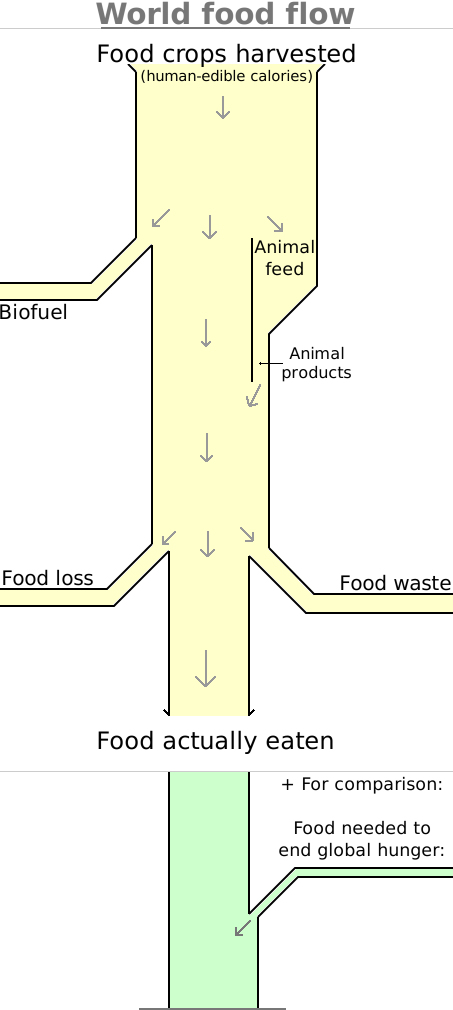Food: Difference between revisions
| Line 1: | Line 1: | ||
The world currently struggles to feed everyone sustainably. But this '''doesn't''' have to be the case. There '''are''' enough resources to feed our growing population - '''if''' resources are used efficiently & ethically. | |||
==Problems== | ==Problems== | ||
Current food-related problems include: | |||
* [[Hunger]] & malnutrition | * [[Hunger]] & malnutrition | ||
** Nearly 900 million people lack calories or protein (1 in 9 people worldwide). | ** Nearly 900 million people lack calories or protein (1 in 9 people worldwide). | ||
| Line 7: | Line 9: | ||
* Environmental impact | * Environmental impact | ||
** [[Habitat loss]], due to agriculture using so much [[land]]. | ** [[Habitat loss]], due to agriculture using so much [[land]]. | ||
** [[climate change|Methane emissions]], | ** [[climate change|Methane emissions]], such as from cows. | ||
** [[climate change|CO2 emissions]] from [[fertilizer]] production. | ** [[climate change|CO2 emissions]] from [[fertilizer]] production. | ||
** Pollution from pesticides and fertilizers. | ** Pollution from pesticides and fertilizers. | ||
* Animal cruelty | * Animal cruelty | ||
** Particularly bad in [[factory farms]], which are the source of most animal products. | ** Particularly bad in [[factory farms]], which are the source of most animal products. | ||
These problems are magnified by ''inefficiency'': | These problems are magnified by ''inefficiency'': | ||
Revision as of 17:23, 24 August 2022
The world currently struggles to feed everyone sustainably. But this doesn't have to be the case. There are enough resources to feed our growing population - if resources are used efficiently & ethically.
Problems
Current food-related problems include:
- Hunger & malnutrition
- Nearly 900 million people lack calories or protein (1 in 9 people worldwide).
- Even more people lack vitamins & minerals, even if they get enough calories & protein.
- Environmental impact
- Habitat loss, due to agriculture using so much land.
- Methane emissions, such as from cows.
- CO2 emissions from fertilizer production.
- Pollution from pesticides and fertilizers.
- Animal cruelty
- Particularly bad in factory farms, which are the source of most animal products.
These problems are magnified by inefficiency:
Solutions
Things that can solve all 4 problems, with the biggest impact:
- Making food more plant-based
(...)( not necessarily 100% vegan, but reducing animal consumption by more than half ) . - Improving crop yields, especially in poorer countries.
- Reducing food waste.
- Not burning edible foodstuffs as biofuel.
Things that also help:
- Gardening and suburban farming.
- Regenerative farming of crops, as long as it doesn't reduce crop yields.
Things that might help in the future:
Things that don't help:
- Vertical farming
- More grass-fed beef
- Organic monoculture
Q&A
Unanswered
How much animal protein could be produced from pasture only, if no crops were ever fed to animals?
How much CO2 is released for every km^2 of deforestation?
How much CO2 is released for every km^2 of destroyed grasslands?
How much carbon does every km^2 of newly-grown forest sequester per year?
How much carbon does every km^2 of newly-grown grasslands sequester per year?
Bottom line
All 8 billion people could be well-fed & healthy, without destroying the planet, and without anywhere near as much harm to animals. But all of this requires both personal changes and systemic changes.
